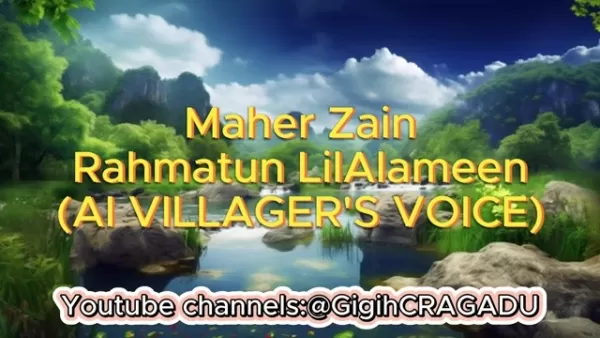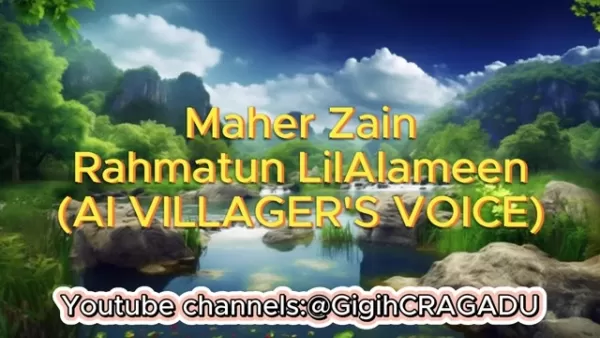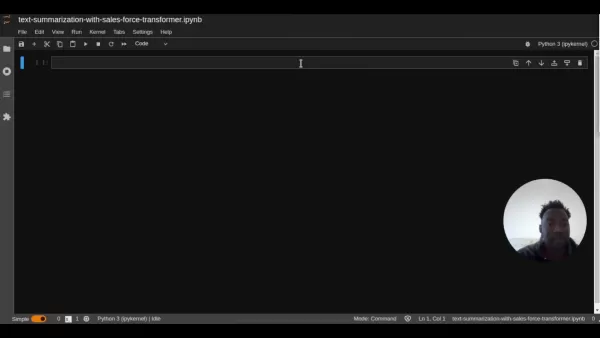Maher Zain's Rahmatun LilAlameen AI Cover: Embarking on a Spiritual Journey
In an age where technology and art converge, music stands at the forefront of innovation. This article explores a remarkable rendition of Maher Zain's spiritually uplifting track, 'Rahmatun LilAlameen,' reimagined through the lens of artificial intelligence. This version captures the essence of a tranquil village setting, breathing new life into a timeless melody. We'll delve into the impact of this transformation, the AI's interpretation, and the stunning visuals that accompany this innovative journey.
What is Rahmatun LilAlameen?
'Rahmatun LilAlameen' translates to 'A Mercy to the Worlds,' a deeply spiritual song by Maher Zain, a renowned Swedish-Lebanese singer celebrated for his inspirational music. The song celebrates the virtues of compassion, mercy, and peace, drawing inspiration from the life of Prophet Muhammad (peace be upon him). Its lyrics and melody are crafted to evoke feelings of tranquility, love, and spiritual connection, resonating with audiences globally. Maher Zain's unique fusion of contemporary music production with traditional Islamic themes has garnered him a dedicated following, making his songs anthems of faith and devotion.
Beyond its spiritual significance, 'Rahmatun LilAlameen' serves as a poignant reminder of unity, kindness, and the importance of spreading positivity. It challenges listeners to reflect on their actions and strive to embody the noble qualities of the Prophet. This universal message of love and mercy transcends cultural and linguistic boundaries, making the song accessible and impactful to people from diverse backgrounds.
The AI's Village Voice: A Fresh Perspective
The real innovation lies in how this rendition transforms Maher Zain's original track through an AI voice designed to mimic the authentic charm of a villager's tone. This approach lends a layer of authenticity and accessibility to the song, stripping away intricate vocal techniques in favor of a raw, heartfelt delivery.
This method invites listeners to connect with the song on a deeper emotional level, emphasizing its lyrical content and emotional depth. The AI version doesn’t aim to replace the original but instead offers a fresh perspective, demonstrating how technology can convey human emotion and cultural nuances.
The serene visuals accompanying this rendition are thoughtfully crafted to complement the auditory experience. Think lush greenery, flowing rivers, and clear blue skies—these landscapes beautifully echo the purity of the AI's voice. Together, sound and vision amplify the song's central message of peace and hope.
Blending Technology and Spirituality
This AI cover marks a groundbreaking union where cutting-edge technology serves as a medium to deliver a spiritually significant message. It opens doors for musicians and technologists alike to explore how AI can democratize musical expression, making it more inclusive and widely appreciated.
 By leveraging AI, this adaptation ventures into an emotional soundscape that connects with listeners on a visceral level. This fusion highlights the endless possibilities when technology is employed to celebrate cultural and spiritual heritage.
By leveraging AI, this adaptation ventures into an emotional soundscape that connects with listeners on a visceral level. This fusion highlights the endless possibilities when technology is employed to celebrate cultural and spiritual heritage.
However, this integration raises profound questions about artistic expression and authenticity. Can AI genuinely capture the essence of human emotion, or does it introduce something entirely novel? These inquiries spark conversations about technology's evolving role in art and its potential to redefine our perception of creativity.
Emotional Resonance and the Message of Hope
At its core, 'Rahmatun LilAlameen' is a song about hope, mercy, and universal love. The AI cover maintains these core values while presenting them in a modern context, preserving the song's original emotional power. The AI's delivery shifts focus toward the lyrics, creating an atmosphere where the spiritual themes emerge even more prominently. This remake inspires reflection on how technology can foster compassion and positive impact, particularly during challenging times. It fosters a sense of spiritual renewal, encouraging individuals to seek inner peace and extend kindness to others.
YouTube Channels
For more insights, check out the YouTube channel @GigihCRAGADU. They dive deep into topics like this, offering engaging content and valuable perspectives.
Advantages and Disadvantages of Using AI in Music
Pros
- Enhanced Creativity: AI tools inspire novel musical ideas.
- Increased Efficiency: Automation streamlines music production.
- Accessibility: Democratizes music creation, reaching broader audiences.
- Preservation: Assists in cataloging and safeguarding traditional music.
- Promotion: Facilitates cross-cultural understanding through music.
Cons
- Authenticity Concerns: Raises questions about the genuineness of AI-generated art.
- Authorship Issues: Challenges traditional notions of ownership.
- Job Displacement: Poses risks to traditional music production roles.
- Emotional Depth: Struggles to replicate genuine human emotion.
- Homogenization: Risks producing standardized AI-generated music.
Frequently Asked Questions
Who is Maher Zain?
Maher Zain is a Swedish-Lebanese R&B singer, songwriter, and music producer who rose to fame for his spiritually inspired songs that merge contemporary music with Islamic themes.
What is the main message of 'Rahmatun LilAlameen'?
'Rahmatun LilAlameen' translates to 'A Mercy to the Worlds.' The song celebrates the virtues of compassion and peace as embodied by Prophet Muhammad, promoting a message of unity and kindness.
How does the AI cover differ from Maher Zain's original?
The AI cover features an AI voice that mimics a villager's tone, offering a simpler and more accessible delivery compared to Maher Zain's contemporary musical production. It presents an alternative interpretation that focuses on lyrical content and emotional depth.
What do the visuals in the AI cover represent?
The visuals depict serene landscapes, including lush greenery, flowing rivers, and clear blue skies, aiming to complement the purity of the AI's voice and amplify the song’s message of peace and hope. They create a tranquil backdrop that enhances the spiritual experience.
In what ways can technology and AI be used for spiritual or cultural purposes?
Technology and AI can democratize musical expression, making it more inclusive and accessible. AI can translate human emotion and cultural nuances in innovative ways, sparking discussions about the evolving role of technology in art and its potential to redefine creativity.
Related Questions
What other songs has Maher Zain composed that carry similar messages of hope and inspiration?
Maher Zain's discography includes inspiring tracks like 'Insallah,' which expresses optimism for the future; 'Palestine Will Be Free,' which conveys solidarity and hope for peace; and 'Thank You Allah,' a song of gratitude and spiritual reflection. These songs reflect his dedication to spreading positive messages through music, resonating with audiences worldwide.
How are AI technologies changing the landscape of music creation and what implications does this have for artists?
AI technologies are reshaping music creation by providing tools that assist in composition, production, and performance. AI algorithms can generate melodies, harmonies, and rhythms, helping artists overcome creative blocks and experiment with new sounds. AI also enhances music production by automating tasks like mixing and mastering, reducing the need for technical expertise. For artists, this means new opportunities for creativity and efficiency. However, it also raises concerns about authorship, originality, and the value of human skill in music. As AI becomes more prevalent, artists must adapt by mastering these tools while preserving their unique artistic voices. This involves embracing AI as a collaborator rather than a replacement.
Can AI be used to preserve and promote cultural heritage through music?
Absolutely! AI offers innovative methods to preserve and promote cultural heritage through music. AI algorithms can analyze and catalog traditional music, making it accessible to global audiences. AI can also generate new music inspired by traditional forms, blending the old with the new to create unique cultural experiences. Additionally, AI can help translate lyrics and cultural narratives, ensuring that the context and meaning of the music are understood across different languages and cultures. This not only preserves cultural heritage but also fosters cross-cultural understanding and appreciation.

Related article
 Seeking Faith and Purpose in an Age of Skepticism
In our modern age of scientific inquiry and critical thinking, maintaining spiritual faith often feels like walking against the tide. Many struggle to reconcile timeless beliefs with contemporary skepticism, leaving them longing for deeper meaning. T
Seeking Faith and Purpose in an Age of Skepticism
In our modern age of scientific inquiry and critical thinking, maintaining spiritual faith often feels like walking against the tide. Many struggle to reconcile timeless beliefs with contemporary skepticism, leaving them longing for deeper meaning. T
 How ChatGPT Works: Capabilities, Applications, and Future Implications
The rapid evolution of artificial intelligence is transforming digital interactions and communication. Leading this transformation is ChatGPT, an advanced conversational AI that sets new standards for natural language processing. This in-depth examin
How ChatGPT Works: Capabilities, Applications, and Future Implications
The rapid evolution of artificial intelligence is transforming digital interactions and communication. Leading this transformation is ChatGPT, an advanced conversational AI that sets new standards for natural language processing. This in-depth examin
 Salesforce’s Transformer Model Guide: AI Text Summarization Explained
In an era where information overload is the norm, AI-powered text summarization has become an indispensable tool for extracting key insights from lengthy documents. This comprehensive guide examines Salesforce's groundbreaking AI summarization techno
Comments (2)
0/200
Salesforce’s Transformer Model Guide: AI Text Summarization Explained
In an era where information overload is the norm, AI-powered text summarization has become an indispensable tool for extracting key insights from lengthy documents. This comprehensive guide examines Salesforce's groundbreaking AI summarization techno
Comments (2)
0/200
![AlbertWilson]() AlbertWilson
AlbertWilson
 August 20, 2025 at 1:01:20 PM EDT
August 20, 2025 at 1:01:20 PM EDT
This AI cover of Maher Zain's track is mind-blowing! The way tech blends with spiritual vibes feels like a cosmic hug. Can't stop listening! 🌟


 0
0
![RyanPerez]() RyanPerez
RyanPerez
 August 7, 2025 at 5:01:02 PM EDT
August 7, 2025 at 5:01:02 PM EDT
This AI cover of Rahmatun LilAlameen is mind-blowing! The way tech blends with soulful vibes feels like a warm hug from the future. Anyone else get chills? 😍


 0
0
In an age where technology and art converge, music stands at the forefront of innovation. This article explores a remarkable rendition of Maher Zain's spiritually uplifting track, 'Rahmatun LilAlameen,' reimagined through the lens of artificial intelligence. This version captures the essence of a tranquil village setting, breathing new life into a timeless melody. We'll delve into the impact of this transformation, the AI's interpretation, and the stunning visuals that accompany this innovative journey.
What is Rahmatun LilAlameen?
'Rahmatun LilAlameen' translates to 'A Mercy to the Worlds,' a deeply spiritual song by Maher Zain, a renowned Swedish-Lebanese singer celebrated for his inspirational music. The song celebrates the virtues of compassion, mercy, and peace, drawing inspiration from the life of Prophet Muhammad (peace be upon him). Its lyrics and melody are crafted to evoke feelings of tranquility, love, and spiritual connection, resonating with audiences globally. Maher Zain's unique fusion of contemporary music production with traditional Islamic themes has garnered him a dedicated following, making his songs anthems of faith and devotion.
Beyond its spiritual significance, 'Rahmatun LilAlameen' serves as a poignant reminder of unity, kindness, and the importance of spreading positivity. It challenges listeners to reflect on their actions and strive to embody the noble qualities of the Prophet. This universal message of love and mercy transcends cultural and linguistic boundaries, making the song accessible and impactful to people from diverse backgrounds.
The AI's Village Voice: A Fresh Perspective
The real innovation lies in how this rendition transforms Maher Zain's original track through an AI voice designed to mimic the authentic charm of a villager's tone. This approach lends a layer of authenticity and accessibility to the song, stripping away intricate vocal techniques in favor of a raw, heartfelt delivery.
This method invites listeners to connect with the song on a deeper emotional level, emphasizing its lyrical content and emotional depth. The AI version doesn’t aim to replace the original but instead offers a fresh perspective, demonstrating how technology can convey human emotion and cultural nuances.
The serene visuals accompanying this rendition are thoughtfully crafted to complement the auditory experience. Think lush greenery, flowing rivers, and clear blue skies—these landscapes beautifully echo the purity of the AI's voice. Together, sound and vision amplify the song's central message of peace and hope.
Blending Technology and Spirituality
This AI cover marks a groundbreaking union where cutting-edge technology serves as a medium to deliver a spiritually significant message. It opens doors for musicians and technologists alike to explore how AI can democratize musical expression, making it more inclusive and widely appreciated.
 By leveraging AI, this adaptation ventures into an emotional soundscape that connects with listeners on a visceral level. This fusion highlights the endless possibilities when technology is employed to celebrate cultural and spiritual heritage.
By leveraging AI, this adaptation ventures into an emotional soundscape that connects with listeners on a visceral level. This fusion highlights the endless possibilities when technology is employed to celebrate cultural and spiritual heritage.
However, this integration raises profound questions about artistic expression and authenticity. Can AI genuinely capture the essence of human emotion, or does it introduce something entirely novel? These inquiries spark conversations about technology's evolving role in art and its potential to redefine our perception of creativity.
Emotional Resonance and the Message of Hope
At its core, 'Rahmatun LilAlameen' is a song about hope, mercy, and universal love. The AI cover maintains these core values while presenting them in a modern context, preserving the song's original emotional power. The AI's delivery shifts focus toward the lyrics, creating an atmosphere where the spiritual themes emerge even more prominently. This remake inspires reflection on how technology can foster compassion and positive impact, particularly during challenging times. It fosters a sense of spiritual renewal, encouraging individuals to seek inner peace and extend kindness to others.
YouTube Channels
For more insights, check out the YouTube channel @GigihCRAGADU. They dive deep into topics like this, offering engaging content and valuable perspectives.
Advantages and Disadvantages of Using AI in Music
Pros
- Enhanced Creativity: AI tools inspire novel musical ideas.
- Increased Efficiency: Automation streamlines music production.
- Accessibility: Democratizes music creation, reaching broader audiences.
- Preservation: Assists in cataloging and safeguarding traditional music.
- Promotion: Facilitates cross-cultural understanding through music.
Cons
- Authenticity Concerns: Raises questions about the genuineness of AI-generated art.
- Authorship Issues: Challenges traditional notions of ownership.
- Job Displacement: Poses risks to traditional music production roles.
- Emotional Depth: Struggles to replicate genuine human emotion.
- Homogenization: Risks producing standardized AI-generated music.
Frequently Asked Questions
Who is Maher Zain?
Maher Zain is a Swedish-Lebanese R&B singer, songwriter, and music producer who rose to fame for his spiritually inspired songs that merge contemporary music with Islamic themes.
What is the main message of 'Rahmatun LilAlameen'?
'Rahmatun LilAlameen' translates to 'A Mercy to the Worlds.' The song celebrates the virtues of compassion and peace as embodied by Prophet Muhammad, promoting a message of unity and kindness.
How does the AI cover differ from Maher Zain's original?
The AI cover features an AI voice that mimics a villager's tone, offering a simpler and more accessible delivery compared to Maher Zain's contemporary musical production. It presents an alternative interpretation that focuses on lyrical content and emotional depth.
What do the visuals in the AI cover represent?
The visuals depict serene landscapes, including lush greenery, flowing rivers, and clear blue skies, aiming to complement the purity of the AI's voice and amplify the song’s message of peace and hope. They create a tranquil backdrop that enhances the spiritual experience.
In what ways can technology and AI be used for spiritual or cultural purposes?
Technology and AI can democratize musical expression, making it more inclusive and accessible. AI can translate human emotion and cultural nuances in innovative ways, sparking discussions about the evolving role of technology in art and its potential to redefine creativity.
Related Questions
What other songs has Maher Zain composed that carry similar messages of hope and inspiration?
Maher Zain's discography includes inspiring tracks like 'Insallah,' which expresses optimism for the future; 'Palestine Will Be Free,' which conveys solidarity and hope for peace; and 'Thank You Allah,' a song of gratitude and spiritual reflection. These songs reflect his dedication to spreading positive messages through music, resonating with audiences worldwide.
How are AI technologies changing the landscape of music creation and what implications does this have for artists?
AI technologies are reshaping music creation by providing tools that assist in composition, production, and performance. AI algorithms can generate melodies, harmonies, and rhythms, helping artists overcome creative blocks and experiment with new sounds. AI also enhances music production by automating tasks like mixing and mastering, reducing the need for technical expertise. For artists, this means new opportunities for creativity and efficiency. However, it also raises concerns about authorship, originality, and the value of human skill in music. As AI becomes more prevalent, artists must adapt by mastering these tools while preserving their unique artistic voices. This involves embracing AI as a collaborator rather than a replacement.
Can AI be used to preserve and promote cultural heritage through music?
Absolutely! AI offers innovative methods to preserve and promote cultural heritage through music. AI algorithms can analyze and catalog traditional music, making it accessible to global audiences. AI can also generate new music inspired by traditional forms, blending the old with the new to create unique cultural experiences. Additionally, AI can help translate lyrics and cultural narratives, ensuring that the context and meaning of the music are understood across different languages and cultures. This not only preserves cultural heritage but also fosters cross-cultural understanding and appreciation.

 Seeking Faith and Purpose in an Age of Skepticism
In our modern age of scientific inquiry and critical thinking, maintaining spiritual faith often feels like walking against the tide. Many struggle to reconcile timeless beliefs with contemporary skepticism, leaving them longing for deeper meaning. T
Seeking Faith and Purpose in an Age of Skepticism
In our modern age of scientific inquiry and critical thinking, maintaining spiritual faith often feels like walking against the tide. Many struggle to reconcile timeless beliefs with contemporary skepticism, leaving them longing for deeper meaning. T
 How ChatGPT Works: Capabilities, Applications, and Future Implications
The rapid evolution of artificial intelligence is transforming digital interactions and communication. Leading this transformation is ChatGPT, an advanced conversational AI that sets new standards for natural language processing. This in-depth examin
How ChatGPT Works: Capabilities, Applications, and Future Implications
The rapid evolution of artificial intelligence is transforming digital interactions and communication. Leading this transformation is ChatGPT, an advanced conversational AI that sets new standards for natural language processing. This in-depth examin
 Salesforce’s Transformer Model Guide: AI Text Summarization Explained
In an era where information overload is the norm, AI-powered text summarization has become an indispensable tool for extracting key insights from lengthy documents. This comprehensive guide examines Salesforce's groundbreaking AI summarization techno
Salesforce’s Transformer Model Guide: AI Text Summarization Explained
In an era where information overload is the norm, AI-powered text summarization has become an indispensable tool for extracting key insights from lengthy documents. This comprehensive guide examines Salesforce's groundbreaking AI summarization techno
 August 20, 2025 at 1:01:20 PM EDT
August 20, 2025 at 1:01:20 PM EDT
This AI cover of Maher Zain's track is mind-blowing! The way tech blends with spiritual vibes feels like a cosmic hug. Can't stop listening! 🌟


 0
0
 August 7, 2025 at 5:01:02 PM EDT
August 7, 2025 at 5:01:02 PM EDT
This AI cover of Rahmatun LilAlameen is mind-blowing! The way tech blends with soulful vibes feels like a warm hug from the future. Anyone else get chills? 😍


 0
0





























